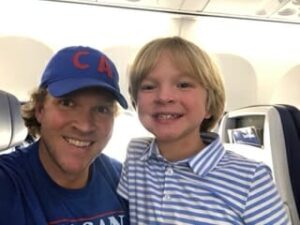
Parents dream of watching their children play in the yard, participate in sports and excel at school activities. For one Ole Miss family, they must endure watching their eldest son be examined by doctors, undergo numerous treatments, and fight off a disease that they never imagined would interrupt their son’s day-to-day life.
The Berry family’s life was turned upside down when their son Charlie faced serious health concerns at 7-months-old when he stopped gaining weight at a normal rate, according to his mother, Molly.
When Charlie’s parents noticed his underdevelopment, they took him to a local pediatrician who showed no signs of concerns but did, however, recommend a pediatric gastrointestinal doctor to Molly and her husband Garner.
The pediatric gastrointestinal doctor said Charlie’s condition looked as if it was a classic reflux condition, which he treated with Prevacid—a medication used to treat stomach ulcers, a damaged esophagus, gastroesophageal reflux disease (GERD), and high levels of stomach acid.
Although the doctor believed the problem was a result of a gastro condition, he decided to start running other tests on Charlie.
“When he was about 9-months-old, [the doctor] ran a CPK test,” she said.
CPK is an enzyme typically found in the brain, heart and skeletal system, which includes the muscles of the body, according to John Hopkins Medicine.
Molly said the normal range for the CPK enzyme is between 13 and 600. Charlie’s CPK test showed his level to be 13,000.
“At that point, the doctor said it was a muscular condition,” she said.
The Berrys were referred to a neurologist, and he decided to run a test for Duchenne Muscular Dystrophy— a genetic disorder characterized by progressive muscle degeneration and weakness.
As the Berrys were walking out the door of the doctor’s office, the doctor advised Molly not to get pregnant because DMD was a genetic disorder.
Two weeks after the DMD testing, Molly found out in fact she was pregnant. She had a wave of panic overcome her because the DMD gene is carried on the X chromosome and is usually found in boys rather than girls. Shortly after Charlie’s diagnosis, Molly found out she was having another boy.
“I was like ‘This is going to be awful. We are going to have two boys with DMD,’” she said.
The Berrys waited until their now youngest son—Baylor—was 1-year-old before testing him for DMD, which came back negative.
As for Charlie, the doctors encouraged the Berrys to see how he developed before diving into treatment plans. The family disagreed and advocated strongly for their son’s health.
“Charlie was diagnosed at 10-months-old,” Molly said. “We said, ‘God gave us this diagnoses early for a reason. We are going to use this to our advantage.’”
They found Dr. Brenda Wong, a muscular dystrophy specialist based in Cincinnati, through a family who also had a child with DMD. The Berrys have made two visits per year to Cincinnati with Charlie for the past eight years.
Wong moved her practice to Massachusetts and created The Duchenne Program at UMass Medical School where she hand-picked her team of dietitians, cardiologists and physical therapists, to name a few, Molly said.

After working with different pharmaceutical companies, Wong found two trial drugs for DMD. Two of the pharmaceutical companies who produced the same drug sent it to be reviewed by the FDA at a faster pace, Molly said. Though one of the drugs was denied, the other was passed in May 2017 by the FDA. Charlie qualified to begin undergoing the treatment.
FDA approved drugs, by law, are supposed to be covered by insurance, Molly said. However, the Berrys insurance company repeatedly denied the coverage for the trial drug because it was experimental.
“So I basically started fighting the fight,” Molly said.
Molly said she relentlessly advocated for her son and the trial drug until she found a doctor in Jackson who coaligned with her passion.
With the help of a care manager, the Berrys were finally able to receive a form of Medicaid known as Disabled Child Living At-Home that approved of Charlie of taking the drug. He is the only child in Mississippi taking the trial drug that is paid for by Mississippi Medicaid, Molly said.
Every Monday, a nurse visits Charlie at home for the drug infusion. Charlie has now had more than 51 infusions since taking the trial medicine.
Charlie’s condition hasn’t gotten better, Molly said, but his numbers have remained stable.
“It’s not a cure, but it is helping us get to the next level, which hopefully someday will be a cure,” she said.
Although Charlie’s medicine is now funded by Medicaid, the Berrys are still not out of the woods with other medical expenses.
Molly decided to create the campaign, “Charlie’s Angels.” The campaign, which was inspired by those who helped Charlie and his family, raises money through the sale of baseball caps that are inscribed with “#Awareness,” because Molly believes DMD is a disease that not many know exists.
The baseball hat was inspired by Charlie participating on a baseball team, which was coached by a family friend who could keep a close eye on him because he is not allowed to participate in contact sports, Molly said.
“At the end of the season, the whole league came together and presented him as the MVP,” Molly said. “There wasn’t a dry eye in the entire place.”
The Berrys have sold more than 300 baseball caps, which are $15 with a $4 shipping cost. As Charlie continues to be treated by Dr. Wong and her team, medical expenses are still wavering over the Berrys.
For those wishing to purchase a “Charlie’s Angels” baseball hat, money can be sent to Molly’s Venmo account at Molly-Berry-2.
